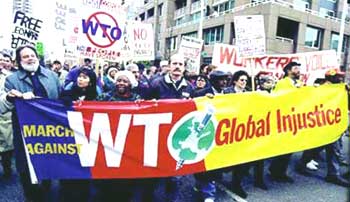1. WTO MEETING COLLAPSES AMID NORTH-SOUTH DIVIDE
The World Trade Organization Ministerial in Cancun
collapsed on Sunday amid irreconcilable disagreements
between Northern nations, led by the United States, and
southern countries, led by China, India and Brazil.
Negotiations, extending into the wee hours of the morning
on Sunday, were unable to bridge fundamental differences.
"The Bush Administration acted like total thugs to the
other WTO member countries," according to Lori Wallach of
Citizens Trade Campaign. "The U.S. hurled threats and
name calling to try to pressure countries, but I think it
backfired. ... The Kenyan Ambassador representing the
African bloc walked out, then he was followed by the
Jamaican ambassador for the Caribbean bloc. As soon as the
Kenyan got down the escalator we could see on his face
that
it was OVER and he started telling what happened to those
near him and then Ambassador Bernal from Jamaica confirmed
what had happened. There must have been 150 civil society
folks in here and in short order the Venezuelan, Nigerian,
Kenyan, Brazilian, and other governments' negotiators
who had stuck out the bullying came down and it was a blur
of hugs, crying, hoots, etc."
On Saturday Mexican Foreign Minister Luis Ernesto Derbez,
who chaired the meetings, offered a draft declaration that
was swiftly rejected by other Southern countries. The
proposal "has arbitrarily disregarded views and concerns
expressed by us," said Indian Commerce Minister Arun
Jaitley. "The document is very far from addressing the
points we wanted," said Brazilian Foreign Minister Celso
Amorim.
In the final analysis, there were almost no areas of
agreement between Northern and Southern countries.
Southern nations objected to massive agricultural
subsidies by the US and EU that result in dumping of basic
grains at prices below the cost of production, threatening
the existence of millions of small Southern producers.
Cotton was of particular concern to some smaller African
and Asian countries that depend on cotton exports for a
significant share of the GDP.
The US, EU and Japan tried to introduce the four so-called
"Singapore issues" for negotiation, but over 90 members of
the WTO objected. The "Singapore issues" would expand
market access for multinational corporations, regulate
competition, open government contracts to
multinational bidders and affect cross-border
transportation.
After the collapse, EU negotiators complained about WTO
rules that prioritize consensus decision-making. EU Trade
Commissioner Pascal Lamy declared, "Despite the commitment
of many able people, the WTO remains a medieval
organization. I said this in Seattle, got a lot of flak
and I have to repeat it here. The procedures and rules of
this organization have not supported the weight of the
task. There is no way to structure and steer discussions
amongst 148 members in a manner conducive to consensus.
The
decision-making needs to be revamped." Apparently Lamy
prefers decisions made by powerful countries behind closed
doors.
US trade representative Robert Zoellick dismissed the
concerns of Southern nations in condescending terms: "...
useful consensus among 148 countries requires a serious
disposition to focus on the work at hand and not rhetoric
... [I]f the WTO and its principal members continue with
rhetoric instead of negotiation, the results will not be
positive."
The WTO collapse and an increasingly assertive Southern
block of "developing" nations represent additional
elements in the political crisis brewing in Washington.
Mired in guerilla wars in Iraq and Afghanistan, and
questioned on growing budget deficits and cuts in social
programs at home, the Bush administration finds in a
crisis of legitimacy that helped embolden Southern nations
to stand firm. It may be that the failed WTO negotiations
will be seen as a turning point, with Southern countries
rejecting the neoliberal model and Washington's unilateral
politics.
2. WTO PROTESTS SEND POWERFUL MESSAGE
Thousands of campesinos, unionists, students, anarchists
and NGOs dominated much of Cancun this week with protest
marches and workshops outlining alternatives to the WTO's
neoliberal agenda. The largest protests, each about
10,000-strong, occurred on Wednesday and Saturday, with a
Korean delegation numbering around 100 taking the lead
both days. On Wednesday, Lee Kyung Hae, president of the
Korean Federation of Advanced Farmers, committed ritual
suicide during a demonstration at the metal fence that
separated demonstrators from the hotel district where the
WTO ministerial was held. Lee was a committed activist
who saw the neoliberal policies promoted by the WTO as the
death of campesinos. According to the Korean delegation,
Lee's action was not planned, but was not unexpected, as
he had tried to commit suicide twice before at
international gatherings protesting the neoliberal model.
Shortly after Lee's death, thousands of demonstrators
destroyed a large section of the fence and battled with
heavily protected police who threw nearly as many stones
as the protestors. Lee's death forced Korean negotiators
to leave the WTO ministerial.
The Korean delegation and a large group of women took
charge of Saturday's demonstration, dismantling a
triple-layer ten-foot-high steel fence, then leading a
ceremony commemorating Lee's sacrifice. The ceremony
ended with
hundreds of demonstrators presenting white carnations to
police. By that time it was becoming increasingly clear
that the WTO would end in failure. The demonstration sent
a powerful message that civil society is capable of
destroying barriers, but also of disciplined action.
Many smaller creative demonstrations also had an impact.
On Monday nude demonstrators spelled out NO WTO on a
ritzy beach near the convention center where WTO
negotiators gathered. Later in the week small groups of
protestors blocked traffic in the hotel zone near the
convention center for several hours at a time. On
Saturday NGOs dumped a bag of genetically modified corn at
the feet of US officials during a press conference,
leading
the WTO to ban NGOs from the press center. Puppets,
banners and marching bands completed a week of creative
mobilizations.
The Mexican government reportedly spent US$20 million on
the failed meetings, plus an additional US$5 million on
security.

